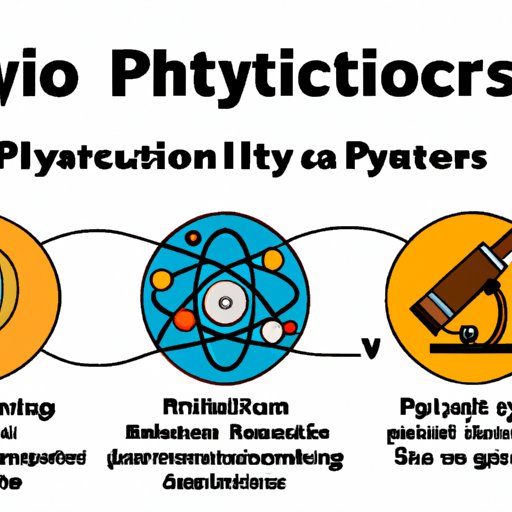Overview of Average Physicist Salary and Factors Affecting Pay
Physicists are highly skilled professionals who specialize in the study of matter, energy, and the relationship between them. From researching quantum mechanics to developing new technologies, physicists play an important role in many industries. But how much do physicists make? Read on to learn more about average salaries for physicists and the factors that affect pay.
Average Salary for Physicists
The median annual wage for physicists in the United States is $118,830. This figure is higher than the median salary for all occupations, which is $39,810. However, salaries can vary widely based on a variety of factors, including education, experience, location, type of employer, and more.
Factors that Affect Physicist Pay
There are several factors that can influence the amount of money a physicist can expect to make. Here is a closer look at some of the major ones.
Education and Experience
Physicists typically need at least a bachelor’s degree in physics or a related field to enter the profession. Although a bachelor’s degree is sufficient for some positions, most physicists will need to pursue an advanced degree such as a master’s or doctorate in order to find employment in their chosen field. The more education and experience a physicist has, the more they can expect to make.
Location
Where a physicist works can also have a major impact on their salary. For example, physicists employed in California tend to be among the highest paid in the country, while those in Alabama may earn less. Location can also affect job availability, as some areas may have more opportunities than others.
Industry
The industry a physicist works in can also affect their salary. Physicists employed in the federal government tend to make more than those working in the private sector, for example. Private companies may offer higher salaries for physicists with specialized skills, such as software development or engineering.
Type of Employer
The type of employer can also influence a physicist’s salary. Those working for universities and research centers may make more than those employed by small businesses or startups. Additionally, physicists who are self-employed or work as consultants can command higher rates than those working for a single employer.
A Look at the Highest-Paid Physicists in the Industry
While the average physicist salary is impressive, there are some physicists who make significantly more than the median wage. These are the top earners in the field:
- Dr. Stephen Hawking – $13 million
- Dr. Michio Kaku – $9 million
- Dr. Neil deGrasse Tyson – $8 million
- Dr. Brian Greene – $7 million
- Dr. Lawrence Krauss – $6 million
These physicists are among the most renowned in their field, and their high salaries reflect their expertise and popularity. They have achieved success through a combination of hard work, dedication, and creativity.

How to Maximize Your Earnings as a Physicist
If you want to maximize your earnings as a physicist, there are several steps you can take. Here are some tips to help you on your way:
Pursue a Graduate Degree
Getting a graduate degree in physics or a related field can open up more job opportunities and increase your earning potential. A master’s degree or doctorate can also give you access to higher-paying positions in academia and industry.
Network and Build Professional Connections
Networking with other physicists and building professional connections can be a great way to get your name out there and find better-paying jobs. Join professional organizations and attend conferences to meet people in your field and build relationships.
Publish Research
Publishing research in scientific journals can help you gain recognition and increase your chances of getting hired for higher-paying positions. It can also provide valuable experience and insight into the field.
Seek Out Leadership Positions
Leadership positions in academia or industry can lead to higher salaries and greater job satisfaction. Look for opportunities to become a supervisor, mentor, or project manager, and use your skills and experience to make a difference.

Career Paths for Physicists and Their Salaries
Physicists have a wide range of potential career paths, each with its own unique salary range. Here is a look at some of the most common career paths and the salaries associated with them:
Academic Physicist
Academic physicists conduct research and teach classes at universities and colleges. They typically earn between $50,000 and $120,000 per year, depending on the size of the institution and the position they hold.
Applied Physicist
Applied physicists develop new technologies and devices for practical applications. They often work in the aerospace, defense, biomedical, and energy industries. Salaries for applied physicists can range from $60,000 to $150,000 per year.
Government Physicist
Government physicists work for federal or state agencies, conducting research and developing new technologies. They typically earn between $40,000 and $110,000 per year, depending on the agency and position.
Industrial Physicist
Industrial physicists work in the private sector, researching new materials and processes for various industries. Salaries for industrial physicists can range from $60,000 to $140,000 per year, depending on the company and position.

The Benefits and Drawbacks of Being a Physicist
Being a physicist can be both rewarding and challenging. Here are some of the advantages and disadvantages of the profession.
Advantages of Being a Physicist
Physicists enjoy a number of benefits, including:
- Intellectual Stimulation – Physicists get to work on challenging and interesting problems every day.
- Variety of Employment Opportunities – Physicists can choose from a wide range of job options in academia, industry, and government.
- Hands-On Learning – Physicists get to experiment in laboratories and use sophisticated equipment.
Disadvantages of Being a Physicist
Despite the advantages, there are some drawbacks to being a physicist, including:
- Stressful Working Environment – Physicists often face tight deadlines and difficult challenges.
- Low Starting Salaries – Entry-level physicists may not make as much as those with more experience.
- Long Hours – Physicists often work long hours in the lab or office.
Overall, being a physicist can be a rewarding and lucrative career path for those who are passionate about science and problem solving. With the right education and experience, physicists can make a good living and enjoy a fulfilling career.
(Note: Is this article not meeting your expectations? Do you have knowledge or insights to share? Unlock new opportunities and expand your reach by joining our authors team. Click Registration to join us and share your expertise with our readers.)
